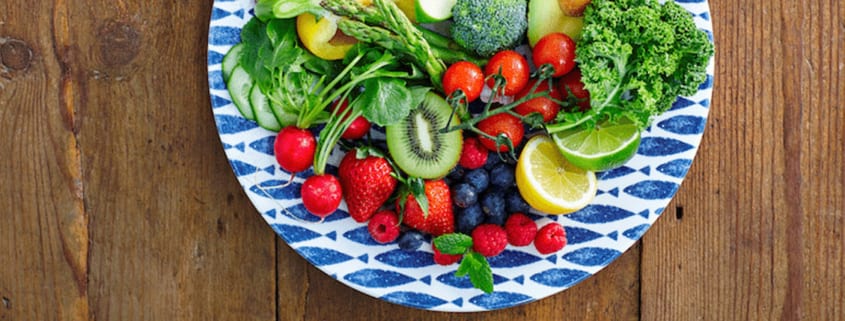Strengthening your immunity during the coronavirus
First Line of Defence: The Lockdown Larder
Healthy food choices are our immune system’s first line of defence to combat illness. With a focus on staying safe and healthy through the coronavirus lockdown, we asked our nutritional therapist Kate Delamar-Morgan to talk us through the immunity-boosting ways we can eat well.
Your immune system is an extremely sophisticated and complex animal, so it makes sense to feed it right and give it the care it needs.
It may seem surprising, but many of the familiar symptoms we can experience when we’re unwell – coughs and sneezes, short term fever, runny nose, diarrhoea or vomiting – are all signs that your immune system is doing its job well.
These responses require specific nutrients to keep them working properly. If your body’s poorly nourished, your immune system won’t function to its maximum potential, leaving you more susceptible to infection and illness.
That’s why a primary line of defence when we’re social distancing, is to eat well. Tempting though they are, processed snacks, sweet treats and ready to eat processed meals or takeaways contain few – if any – immune-supporting nutrients, compared to a meal you’ve made yourself.
In fact, pretty much anything packaged and containing more than five food ingredients – or with nutritional information that reads like a chemistry experiment – isn’t ideal, especially during lockdown when we’re focused on staying well. Instead, look out for recipes to recreate your favourite ready-meal or takeaway from scratch; from soups and smoothies to pasta sauces and curries.
When you’re meal-planning, choose from the following whole and natural ingredients and, if it’s within your budget, go for organic and grass-fed options.
Immunity boosters: Your Covid-19 lockdown larder
- Lean fresh meats and organ meat such as liver, and kidneys.
- Fish (white and oily)
- Eggs
- Nuts
- Seeds
- Fruit and vegetables
- Natural dairy products such as milk, cheese and unsweetened yoghurt
- Pulses including lentils, chickpeas and beans,
- Wholegrains including wheat, rye, barley, jumbo oats, brown rice, millet, corn, buckwheat, teff and quinoa
- Soya, including tofu and miso)
- Olives and olive oil
- Coconut
- Avocado
Eat the rainbow
Try to eat balanced meals containing some protein, some starchy carbohydrates (grains, potatoes, root veggies), and half a plate of other leafy vegetables and some fruit – recreate the rainbow on your plate. Fruits and vegetables provide a multitude of immune-supporting phytonutrients and beta-carotene (a plant source of vitamin A).
Add flavour with the liberal use of dried and fresh herbs and spices – these not only have anti-inflammatory properties which boost your immune system, but add interest and make dishes tasty.
Frozen fruits, vegetables and herbs are brilliant staples in the lockdown larder, while you can also cook fish from frozen.
Immunity-boosting – go with your gut
Our digestive tracts and friendly gut bacteria play a key role in supporting the immune system, which will benefit from fermented foods in your diet. These include sauerkraut, kimchee, kefir, live natural yoghurt and fermented soya products such as tempeh, miso and natto.
Immunity boosters – which foods do what?
Our bodies are fortified with frontline defence systems; from our skin and tiny hairs in our noses and respiratory tracts, to mucus, stomach acid and so-called ‘friendly’ gut bacteria. If these frontline defences are breached by a virus or infection, then a second line of defence kicks in – our white blood cells, the lymphatic system and antibodies.
Here’s how the most important factors in the food chain play their part in maintaining and protecting our body’s immune defences, from skin to stomach acid – and (sorry, not sorry…) snot.
- Protein– supports the metabolism and functions of immune cells.
- Vitamin A– plays a role in maintaining the health of mucosal tissues and barrier function, and is involved in regulating immune responses. A very good source is organ meat, particularly liver, as well as eggs, dairy products and oily fish.
- Zinc – plays a central role in the immune system and the functioning of immune cells. A deficiency of this mineral increases our susceptibility to a variety of infections. Good sources include: shellfish, poultry, game, lean red meat, pulses, seeds (especially pumpkin), nuts and wholegrains.
- Vitamin C– helps support the white blood cells in fighting infections and also enhances iron absorption. Good sources include peppers, kiwi fruit, citrus fruit, berries and papaya.
- Iron – can help protect against vulnerability to infection. Good sources are red meats, green leafy vegetables, liver, eggs wholegrains, beans, lentils, nuts, seeds, dried fruit (especially apricots) and parsley.
- Quercetin – may help to modulate your immune system and improve the antioxidant capacity of the body. Particularly good sources are green leafy vegetables, onions, apples, peppers and grapes.
- Vitamin E– one of the most efficient antioxidants and plays an important role in lung and liver protection and defends against free radicals that can damage cells. Lack of this Vitamin E may alter immune responses. Particularly good sources are avocados, nuts, sunflower seeds, unrefined oils, wholegrains and liver.
- Selenium – a potent antioxidant. A deficiency of this mineral may increase vulnerability to infection. Brazil nuts are a particularly good source.
Snack right
It’s very tempting to reach for convenient comfort foods, treats and snacks during lockdown – or pour yourself a cheeky tipple.
The bad news is this: Sugary, refined and processed foods can suppress the action of white blood cells, which has a direct impact on the immune system, while processing alcohol depletes your body nutrients that might otherwise be available to the immune system.
Moving towards a non-processed diet is a straightforward way to manage and reduce your sugar intake. You can sweeten things up by using fresh fruit, a little dried fruit and occasional treat such as raw honey or maple syrup, while spices including cinnamon and vanilla can help satisfy a sweet-toothed craving.
De-stress your diet
Healthy eating is key to boosting our immune system. Yet it’s not just the food choices we make, but the lifestyle factors that influence how our digestive and nervous system function.
The immune system can be dampened by high levels of cortisol, a hormone that’s produced by the adrenal glands when you’re stressed. This can leave you more vulnerable to illness. The more nutrient dense you make your meals, the more nutrients are available for optimal functioning of the adrenal glands.
If you’re prone to stress or anxiety, also try some meditation. I’ve found it gets easier the more you do it and there are lots of apps and online tutorials to guide you. A daily10 minute meditation can support your body’s stress systems, as well as provide breathing exercises which support your central nervous system.
Sunshine vitamin
Another important nutrient for the immune system is vitamin D. Exposure to the primary source, sunlight is really important – so please get out there and do your daily exercise. Sunlight on your skin triggers a process in the body which results in production of available active vitamin D.
Stay hydrated
Drinking plenty of water helps your body flush itself of waste, dead cells and toxins via the lymphatic system. Drink a glass of water on waking to hydrate your body and sip herbal teas, or hot water infused with fresh mint or lemon and ginger, through the day. If you replace just one or two of your tea and coffees every day, it’s a great start.
Sleep well
A good night’s sleep helps our bodies to repair and detoxify. Broken, or lack of sleep can hamper this nightly re-set mode, placing an additional burden on your immune system.
Good sleep well relies on a number of factors, including eating the right things during the day, avoiding sugar and stimulants in the evening and a relaxing bedroom environment – which means going digital-free at least an hour before lights out!
Kate Kate Delmar-Morgan BSc Hons, mBANT, rCNHC, mIFM is a registered nutritional therapist offering support and consultations at ReCentre Health in Balham and online during social distancing. Kate specialises in nutrition for immune system and digestive health, as well as hormonal, stress, anxiety or sleep issues. Be inspired by her #lockdownlunches on Instagram @katedelmarmorgan or contact her at kate@katedelmarmorgan.co.uk or 07870 242 916 if you’d like to discuss how a virtual appointment could work for you.
Take care, stay safe and healthy…
Image credit: Vegan Liftz















